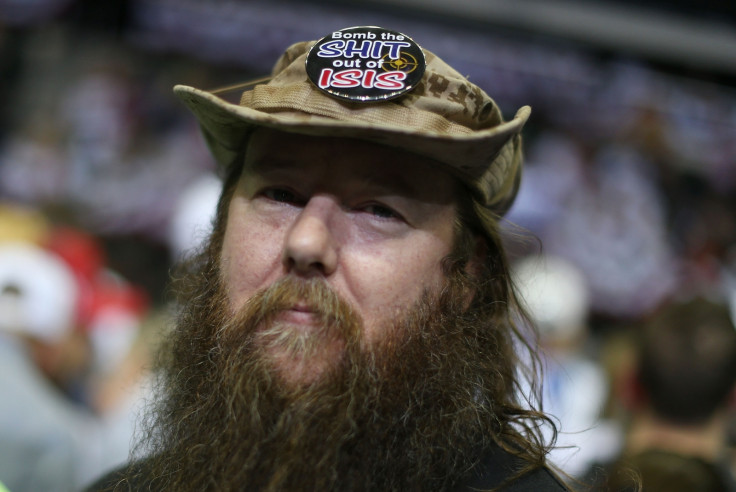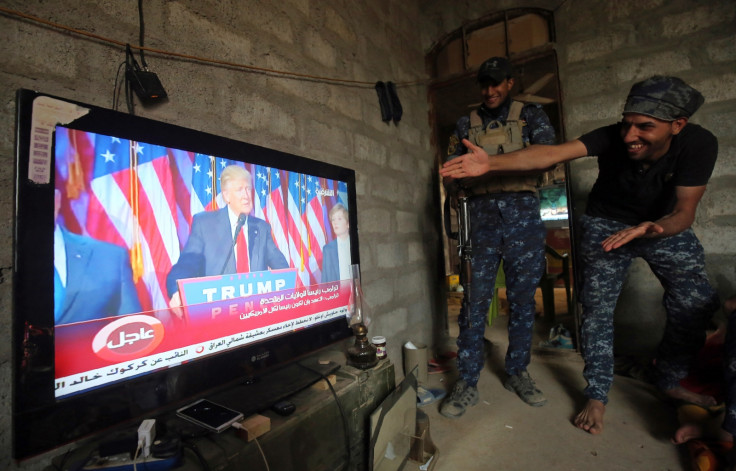Trump's 30 day plan to defeat Isis is a lesson in how not to fight terrorism
Those who voted for Trump because he promised to beat Isis were grossly misled by his naive foreign knowledge.

At the end of February, we should be able to celebrate the beginning of the end of Isis. Precisely 30 days after taking office, Donald Trump has promised he will unveil his plan that will enable the world to get rid of the terror group whose "propagation to 32 countries" he blames on miscalculations of the current American administration.
"We are going to convey my top generals and give them a simple instruction," Trump said, triumphantly, in front of a crowd in Greenville, North Carolina, on 6 September. "They will have 30 days to submit to the Oval Office a plan for soundly and quickly defeating Isis. We have no choice."
This order for his commander-in-chief to provide the keys to victory follows the revelation of a "secret plan".
"We're gonna beat Isis very, very quickly folks. It's gonna be fast," Trump said at on April 23 at a rally in Waterbury, Connecticut. "I have a great plan. It's going to be great. They ask, 'What is it?' Well, I'd rather not say. I'd rather be unpredictable.
"I don't want to be like Barack Obama where he announced a few months ago we are sending 50 soldiers, our finest, to Iraq and Syria," Trump added. "Why do you announce that? Why do you tell the enemy that you're sending people over there and they now have a target on their backs?" The candidate promised to make the American military so powerful that "no one is going to mess with us."
On 27 April, during remarks on foreign policy, Trump threatened Isis' jihadists with a rueful flourish: "I have a simple message for them: their days are numbered. I won't tell them where and I won't tell them how... We must as a nation be more unpredictable. We are totally predictable. We tell everything. We're sending troops; we tell them. We're sending something else; we have a news conference. We have to be unpredictable. And we have to be unpredictable starting now. But they're going to be gone. Isis will be gone if I'm elected president. And they'll be gone quickly."
Until then, comments from Trump in connection with the fight against international terrorism had been rather vague.
In an interview with CBS' 60 Minutes on 27 September, he was pleading for isolationism in Syria and interventionism in Iraq at one-minute intervals. "I would end Isis forcefully. I think Isis, what they did, was unbelievable what they did with James Foley and with the cutting off of heads of everybody, I mean these people are totally a disaster. Now, let me just say this: Isis in Syria, Assad in Syria, Assad and Isis are mortal enemies. We go in to fight Isis. Why aren't we letting Isis go and fight Assad and then we pick up the remnants?"
In Iraq, however, he announced his intention to strike hard. And directly. "Look with Isis in Iraq, you gotta knock 'em out. You gotta knock 'em out. You gotta fight 'em. You gotta fight 'em. You have to stand...." "On the ground?", the anchorman asked. "If you need, you're going to have to do that, yes." "Troops on the ground?" "Yes," Trump insisted.

Exit polls suggest the majority of Trump supporters think terrorism and immigration are the most pressing issues facing America, so it's clear voters have faith in his confident rhetoric.
But fighting against terrorism requires several qualities that don't rely on political promises that can't be kept, made to an electorate subjected to fear. These virtues are patience, perseverance, coherence, knowledge of the ground and history, and solid ethical convictions.
The fight against terrorism can't afford a stop-go programme, alternating massive investment followed by complete abandonment, in the way that the West has regularly done in Afghanistan.
It cannot afford short-term interventions that leave behind conditions that will enable the next terror group, one which is more radical and more dangerous than the one we dislodged. It cannot be beneficial either if it is ideological, or used as a tool for political purposes.
With the battle for Mosul beginning to sputter, it is wise to look back at history. This is the fifth battle of Mosul for us since 2003. In 2003, American troops overran the city relatively easily, in the midst of the Iraq invasion. But the American occupier left the city's keys to the Kurdish peshmergas. In November 2004, at the same time as the second battle of Falluja, which largely destroyed the town, the insurrection tried to open a second front to take control of the city.
In 2008, the American army was again forced to launch a major operation to topple the insurgents. In 2014, the city ended up falling again, like a ripe fruit. It took Isis only two days to become the city's masters.
Witnesses reported that civilians were not necessarily happy about the jihadists' accession to power, but they were all relieved to see the retreat of the Iraqi security forces – the same ones who we have just entrusted with taking over the city again.
CIA Chief General David Petraeus always insisted that we should not attempt to conquer a territory that you do not have the will or the means to hold afterwards. The main question that strategists of the current Mosul offensive should ask is what to do to ensure this takeover of Mosul is the last.
The war against terror did not start on September 11. It can seem frustrating, because progress is so slow and the groups claiming to be part of the jihad seem to ignore the extremely expensive military operations the West is inflicting on them. Should we conclude that this war is lost? Absolutely not. But it is not by promising a quick and immediate happy ending to an already weakened audience that we will win it.
Nicolas Hénin is a journalist and expert in the Middle East. He was held hostage by the Islamic State between June 2013 and May 2014. He is the author of 'Jihad Academy, the Rise of the Islamic State' (Bloomsbury).
© Copyright IBTimes 2025. All rights reserved.




















